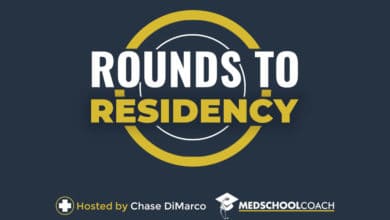Beth Garbitelli, a 3rd-year medical student at Tufts University School of Medicine, discusses her journey to medicine and her recommendations for building your CV during the COVID pandemic.
- [01:55] From Journalism to Law to Medicine
- [09:27] Changes in Clinical Clerkships During Covid
- [16:56] Longitudinal Clerkships
- [24:49] Recommendations for Med Students
Today, Chase DiMarco talks to Curbsider’s Beth Garbitelli. Beth is a 3rd-year medical student at Tufts University School of Medicine on the Maine Track. She’s been a producer and social media manager for The Curbsiders podcast since 2017. She also loves to bake and is a former journalist and recovering paralegal.
How and Why Beth Made the Shift to Medicine
Before making the shift to medicine, Beth was an English and Psych major in college. She had always been interested in medicine but often thought that it was too difficult a field to detour into and often kept the idea of the medical profession on a pedestal in her mind. As a journalist, Beth covered the opioid epidemic and remembers wishing she could be the healthcare professionals she interviewed. She got into law as the “easier” route to where she thought she wanted to go. She became a paralegal and was able to start paying off some of her student debt, but she always gravitated towards cases and projects related to medicine. When her paralegal peers moved on to applying to law schools and preparing for the LSAT, she realized that she could go to medical school. In a lot of ways, Beth’s path to medicine involved her ruling out a lot of other options.
Beth began listening to the curbsiders before she had gotten into med school. Initially, it was a way for her to keep listening to and engaging with medical content while she was working on other jobs. After listening to the curbsiders podcast for a while, she thought she should try to work for them and soon found out that they were hiring. She started at the curbsiders as the Instagram manager and had found a way to weave her media experience with medicine. She now also manages their Twitter, and produces episodes, creates infographics, and compiles show notes as they need them.
Changes in Clinical Clerkships During the Pandemic
The pandemic has made virtual clerkships and teleclerkships a reality and although it’s not ideal, it is the only option available to a lot of students. These kinds of clerkships can feel more like “observerships” and make consultations difficult and physical exams impossible. Keeping students safe in a clinical setting requires a vast amount of infrastructure and resources and is generally more manageable in low-density rural areas and areas with fewer coronavirus cases.
For Beth, the pandemic hit the US in the last week of her second year, just before she went on break for step 1-dedicated. Covid affected her step 1 prep more than her clinical work and that of her classmates; they have been on clinical sites since the middle of 2020.
Longitudinal Clerkships
Beth is currently doing a longitudinal clerkship and recommends it for anyone who has access to such a program. With a longitudinal clerkship, students have more independence and ownership of their schedules, and they have the ability to follow their patients. These clerkships are often run at small satellite rural hospitals.
In her longitudinal program, every day is a little different and schedules change from week to week, which is sometimes dependent on the preceptors’ schedules. For Beth, Mondays are surgery days. On Tuesdays, she has a half-day of pediatrics and the rest of the day is for self-directed learning that she can use to study or shadow the hospitalist team. Wednesdays are shared between outpatient internal medicine and the emergency department. Thursdays are Psych days and split between 2 different preceptors and Fridays are dedicated to OB/GYN – either clinic or surgery – with family medicine in the afternoon.
The first couple of months of a longitudinal clerkship are much harder than usual clerkships and constantly shifting between specialties can be very overwhelming. However, Beth has observed the birth of babies and then followed them to their pediatric appointments, and their moms to their OB/GYN follow-ups, allowing her a depth of experience very few have access to. In addition to the longitudinal care of her patient panels, Beth has also built great relationships with her preceptors.
Traditional rotations can often be very disheartening for med students in a rotation that they don’t particularly like and are stuck in for months at a time. Longitudinal clerkships provide an interesting and beneficial way of approaching clerkships but the logistics of introducing these programs have proven to be a major barrier to their implementation on a broad scale.
Recommendations for Students
Beth urges students to build enough time into their schedules for studying and taking time for yourself. It is also important that students think about their strengths and seek opportunities that highlight those strengths for a residency interview. It can be overwhelming to find time to seek out internships and projects you are excited about while you are busy with school and clinical work, but beth is certain that your efforts will ultimately only help you.
Check out The Curbsiders Internal Medicine Podcast
Get in touch at MedSchoolCoach. Sign up for a Free Coaching session with Chase DiMarco, sponsored by Prospective Doctor! You can also join the Med Mnemonist Mastermind FB Group today and learn more about study methods, memory techniques, and MORE! Do check out Read This Before Medical School. Like our FreeMedEd Facebook page and find our Medical Micro Course, Blog posts, and Podcasts at FreeMedEd.org! Feel free to Email any Questions or Comments.
